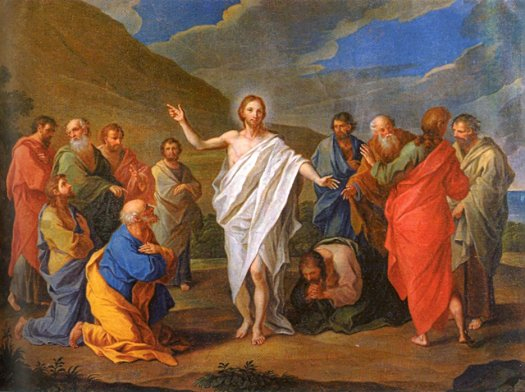Christian Art | Scribes And Pharisees, Hypocrites
Matthew 23: 27-32 – Week 21 Ordinary Time, Wednesday (Audio Bible KJV, Spoken Word)
27 Woe unto you, scribes and Pharisees, hypocrites! for ye are like unto whited sepulchres, which indeed appear beautiful outward, but are within full of dead men’s bones, and of all uncleanness.
28 Even so ye also outwardly appear righteous unto men, but within ye are full of hypocrisy and iniquity.
29 Woe unto you, scribes and Pharisees, hypocrites! because ye build the tombs of the prophets, and garnish the sepulchres of the righteous,
30 And say, If we had been in the days of our fathers, we would not have been partakers with them in the blood of the prophets.
31 Wherefore ye be witnesses unto yourselves, that ye are the children of them which killed the prophets.
32 Fill ye up then the measure of your fathers.
Jesus’ critique of the scribes and the Pharisees continues in today’s Gospel verses. The accusation is constant: they are hypocrites. The imagery in part remains constant: these hypocrites put on outward shows of purity, and yet their hearts are corrupt and their behaviour is corrupt. This imagery now develops. Woe unto you! For you are as painted tombs, all white and purportedly pure and true on the outside, while within the dead flesh rots. In their souls, the scribes and the Pharisees are unclean. Ironically, they are in themselves a violation of the laws of purity. In their hearts, the scribes and the Pharisees carry spiritual death.
The hypocrisy and spiritual death of the scribes and the Pharisees are as one. There is a legacy of death, as of hypocrisy – as of false reading of God’s true communications to mankind. Even as the scribes and the Pharisees say that had it been theirs to do in the days of their fathers, then the blood of the prophets would not have been shed, so they condemn themselves by their own rule, now multiply ironic given their attack against Jesus. Jesus reflects upon the Law’s insistence of the son and the father being legally bound as he hurls the challenge at these hypocrites, who now want to kill Jesus: well then, be as you fathers, even as you say you would not have been to the prophets as they were; fill ye up the measure of your fathers.
There is so much anger and so much hatred in these verses. This does not flow from Jesus, but Jesus brings it to light. Jesus drives a sword into this well of denial and hatred – there is a purging action, a great release, which will require Jesus’ death to complete the letting forth. Here are people locked in hatred. There is hatred of the occupying powers, but more than this: hatred within people’s selves.
Jesus is the sacrificial lamb. In one aspect, Jesus goes meekly to the sacrifice. But we do not see meekness here. There are many aspects to Jesus which sit alongside one another. Here is righteous anger and active challenge. Here is God the Son saying to those who have perverted the way: look on the evil you inflict on my people, and in my name, in my Father’s name, in the name of God.
Jesus tells his accusers, the scribes and the Pharisees, that they witness against themselves. They represent hatred – Their little ways of reasoning begin from hatred, run through hatred and only end in hatred. Over and above this, there is Jesus’ love.
All that is in these Bible verses speaks to us about the here and now. Where there is hateful reasoning, hateful logic, hateful thinking, we are enabled by Jesus to know that his saving gift of himself on the cross is always available to us – that love is greater than hatred, infinitely so.
Concluding Prayer
Lord, holy Father, faithful to your promise
you sent your Spirit
to bring together a people divided by sin.
Give us grace to foster unity and peace among men.
Through Christ our Lord.
Audio Bible KJV | Endnotes
Blood Of The Martyrs
These words of Jesus are a scathing rebuke of the religious leaders of his time. Jesus accuses the scribes and Pharisees of hypocrisy, of appearing outwardly righteous but inwardly corrupt. Jesus compares the scribes and Pharisees to whited sepulchres, which were tombs that had been painted white on the outside to make them appear clean and beautiful, but inside were filled with death and decay.
Jesus also accuses the scribes and Pharisees of being responsible for the deaths of the prophets. They built tombs for the prophets and garnished the sepulchres of the righteous, but Jesus saw through their actions. He knew that they were not honoring the prophets, but rather trying to distance themselves from the guilt of their forefathers who had killed the prophets.
Jesus warns the scribes and Pharisees that they are witnesses unto themselves, that they are the children of those who killed the prophets. He tells them to fill up the measure of their fathers, indicating that they are continuing the same evil deeds that their forefathers did. And he calls them serpents and a generation of vipers, condemning them to the damnation of hell.
The blood of the prophets is a recurring theme. In the Old Testament, the prophets were often persecuted and killed for speaking the word of God. Jeremiah was thrown into a pit and left to die, Elijah was hunted by Jezebel, and Isaiah was sawn in half.
In the New Testament, Jesus himself was a prophet who was ultimately killed for his teachings. John the Baptist, another prophet, was beheaded by King Herod. The apostles were also persecuted and killed for preaching the gospel. Paul was beaten, stoned, and imprisoned, and eventually beheaded. The book of Hebrews speaks of the prophets who were ‘tortured, not accepting deliverance; that they might obtain a better resurrection’ (Hebrews 11:35).
Throughout history, Christians have grappled with the meaning and significance of the blood of the prophets. The Church has canonized many of the prophets as saints, recognizing their courage and fidelity to God. Saint John Chrysostom, fourth-century bishop and theologian, wrote that the blood of the prophets was a witness to the truth of their message. He said: ‘The martyrs are witnesses of the truth of what they have said; for they would not have died for a falsehood.’
Protestant theologians have also reflected on the blood of the prophets. Martin Luther, the father of the Protestant Reformation, saw the prophets as foreshadowing the coming of Christ. He wrote: ‘The Holy Spirit had to kill the prophets and apostles, and all who believed their word, in order that Christ might come and that the new world might be created.’
Pope Francis has spoken about the importance of listening to the prophetic voice in our world today. In his 2013 apostolic exhortation Evangelii Gaudium (The Joy of the Gospel), Pope Francis wrote:
‘I prefer a Church which is bruised, hurting and dirty because it has been out on the streets, rather than a Church which is unhealthy from being confined and from clinging to its own security… I do not want a Church concerned with being at the center and then ends by being caught up in a web of obsessions and procedures. If something should rightly disturb us and trouble our consciences, it is the fact that so many of our brothers and sisters are living without the strength, light and consolation born of friendship with Jesus Christ, without a community of faith to support them, without meaning and a goal in life.’
This call to engage with the world and to be a prophetic voice for justice and compassion has been a central theme of Pope Francis’ papacy. He has also spoken out about the persecution of Christians around the world, calling attention to the suffering of those who are killed or oppressed for their faith.








